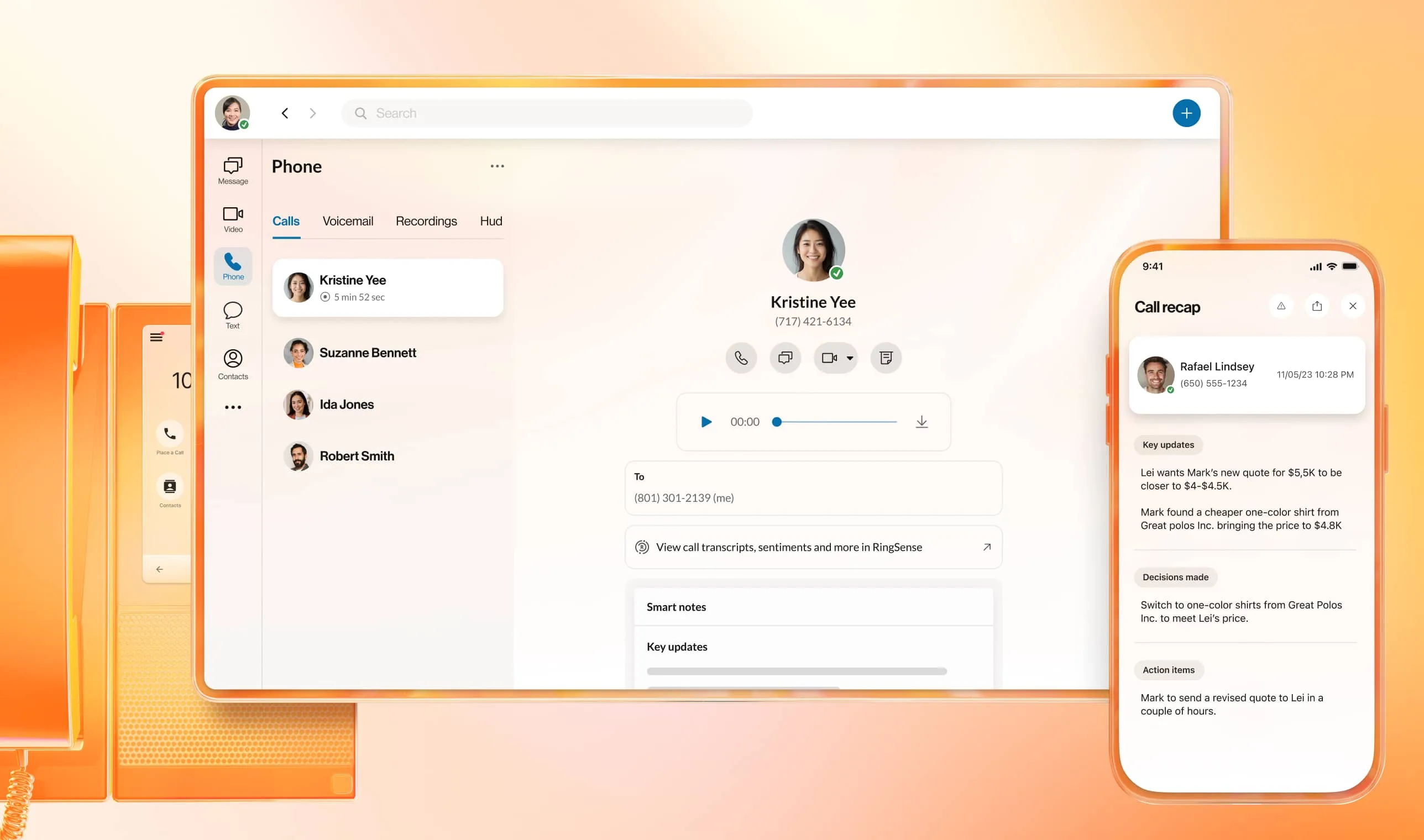VoIP in business
Empower your organization with a VoIP-based communications solution. Enjoy crystal-clear calls from locations that suit you.

What is VoIP?
VoIP stands for Voice over Internet Protocol. It’s a technology that allows users to make and receive calls via the internet. So, instead of bulky infrastructure and equipment, you only need a stable internet connection to make a call.
How does VoIP work?
When a user calls from a VoIP phone, their audio is converted into digital data packets. These are transmitted via the internet to reach their intended recipient.
On the face of it, VoIP devices provide a near-identical experience to landline phones. A user inputs a number into their device and can instantly make a call. As we’ll explore in more detail later, the difference lies in quality, functionality, and practicality. So, it's a familiar experience, but boosted to meet the needs of the modern world.

How does VoIP work for business?
How does a business VoIP system work? VoIP technology is designed to be built around business needs. Let’s look at some of the different ways that VoIP works for businesses:
Software-based
A VoIP system can be set up on your device in a matter of seconds. What’s more, collaborative features such as file sharing and group messaging can be accessed in a few clicks. This means you can get straight to work communicating with co-workers.
Hosted by business Voice over IP providers
All the infrastructure required for virtual phone systems to run effectively is hosted by your provider. That means that maintenance, updates, and security are all handled externally. You only pay for access.
RingCentral, for instance, provides voice services for business, unified communications solutions, and more via a VoIP-based platform.
Paid on subscription
VoIP providers often provide a variety of payment options. Your business can find the best package for its needs and switch when needed. That’s why VoIP for growing businesses is a perfect solution.
Accessible across locations and devices
Employees only need an internet connection to use VoIP-based platforms. So, whether they’re on the go or at home, they can communicate effectively from their chosen device. Regardless of their location, employees can stay “in the loop”.

Advantages of VoIP for business
At this point, you’re probably asking, “how can VoIP help in my business?”. Here are some of the top benefits of VoIP for small business and large alike:
Suited to remote and hybrid working
With more and more employees filling fully remote or hybrid roles, maintaining strong communication has never been more important.
Traditional landline phones aren’t practical in a remote setting, as employees may lack the space to install the required hardware and infrastructure. Alongside this, traditional phones only provide a single function; audio calls. This isn’t enough for remote employees to work effectively together.
As mentioned, with VoIP in business, employees only need a stable internet connection. There’s no need to install any bulky hardware; a simple headset and webcam are all that’s needed to communicate.
What’s more, alongside audio calls, a VoIP phone service can often provide more varied functionality. Users can access features such as video conferencing, call recording, and file sharing, giving remote employees everything they need to work productively.
You can get the most out of your team regardless of whether they’re in the office or working from home.
Flexibility and scalability
As your business grows, so do your communication needs. Traditional communications solutions are often challenging to scale. Each time you wish to expand, you’ll need to install additional hardware and infrastructure.
A small business or enterprise VoIP phone system is a solution that enables you to scale up or down easily. Instead of installing lots of bulky hardware, you can add lines and users with a click, or switch to a payment package that more closely aligns with your needs.
Cost-efficiency
Think for a moment about all the costs associated with managing a traditional phone line. Alongside paying for initial hardware, you’ll also spend money fitting necessary infrastructure. Systems must be maintained and may require maintenance. These costs can quickly add up and impact your overall bottom line.
With a VoIP system, you’ll only pay your subscription fee. Infrastructure, maintenance, and security are all handled by your provider. For large organizations with high amounts of physical hardware, switching to VoIP can save a considerable amount of money.
Integration with other business tools
The best VoIP solutions can be integrated with a variety of other tools. Some popular VoIP integrations include:
- Data analytics - Every interaction, whether with customers or co-workers, carries insights. Data from your VoIP software can be fed directly into analytics programs. From there, you can gain insights for building better customer relations and improving internal efficiency.
- Customer relationship management (CRM) - Logs of conversations with customers can be automatically stored in your CRM. These can be used for training purposes and to enhance your customer understanding.
Future-proof
Traditional public switched telephone networks (PSTN) are being gradually phased out in many countries, as people seek faster, more efficient forms of communication. This means it will become increasingly more difficult to rely on traditional phone lines.
VoIP is a future-proof solution that embraces modern technologies like the cloud. What’s more, VoIP will continue to grow and improve as new technologies arrive. The rise of artificial intelligence (AI), for example, has already introduced many new functionalities, such as the ability to create accurate, real-time call transcriptions.

RingCentral RingEX: Making the most of VoIP for business
RingCentral RingEX is much more than a standard VoIP phone system. Here are some of the ways that RingEX goes the extra mile:
Your choice of business phone numbers
Your business phone number isn’t just your direct link for clients, co-workers, and partners. It’s part of your wider business identity. That’s why having the right number is crucial for establishing your brand and growing your network.
RingEX offers a variety of business phone number options, including:
- Local numbers - Ideal for establishing your business in a specific area. RingCentral provides local phone numbers from over 200 US area codes. What’s more, you don’t even need to operate in the area. You can answer calls from wherever you’re based.
- Toll-free numbers - Suited to organizations that want to operate across multiple states, or even outside the US. Best of all, RingCentral plans offer toll-free minutes with the option of purchasing toll-free minute bundles.
- Vanity phone numbers - Perfect for companies that want to enhance their brand. RingCentral offers the option of customizing your number to make it more memorable. For an extra fee, you can also choose a number to represent your entire organization.
RingEX lets you take control of your calls with a selection of call management features, including:
Call management
- Voicemail - Each department and extension has its own, easy-to-access voicemail inbox. These provide a variety of options for managing voice messages, such as setting a default greeting, recording a custom response, or using professionally recorded greetings.
- Call forwarding - Regardless of whether you need sequential or simultaneous calls, to prioritize calls based on criteria, or to send them to voicemail, call forwarding ensures that you never miss a call. With RingEX, you can also use custom call forwarding settings (based on a caller ID or area code), call waiting, and a host of other features.
- Call Flip - Effortlessly move live calls from one number to another, such as your deskphone or mobile. Call Flip improves efficiency and ensures that employees never miss a call.
All your other communication channels in one place
Say goodbye to the tedious process of switching between communication channels. With RingEX, everything you need is in one centralized space. From the RingCentral interface, you can get easy access to business SMS, instant messaging, conferencing, and more.
Even better, RingEX works from any device. So, you can communicate effectively no matter where or how you’re working. This means improved team management and collaboration, and boosted efficiency.
AI-powered features
Artificial Intelligence is transforming the business landscape. RingEX is an AI business phone system that puts you at the heart of this innovation.
One example is our personal AI assistant, designed to capture call notes, transcribe calls, translate messages, and refine your writing. Transcriptions can serve as logs of customer interactions, while call notes can help train employees. AI can also summarize conversations, so employees can get the lowdown, even when they’re unable to attend meetings.
Thanks to conversation intelligence, AI also helps guide better customer interactions. Teams can benefit from automatic call summaries, so they can quickly identify and correct problem areas. Alongside this, AI will track key topics, competitors, and products with Insights that reveal your customers’ top priorities.
Integrations with your other business tools
One of the reasons VoIP is so popular is the ability of VoIP-based solutions to integrate with other key business tools, such as your CRM.
RingEX boasts over 500 pre-built integrations designed to elevate productivity. This includes integrations with popular solutions such as Salesforce, Microsoft Teams, and Google Sheets.
VoIP in business FAQs
- Massively reduced amount of bulky hardware in–office.
- Improved call quality and stability (provided you have a stable connection).
- Centralized communication channels, such as video calling, email, and SMS.
- Boosted scalability. A business can add users or features easily, or simply scale its payment plan up or down depending on its needs.
- You find scaling up your business a challenge
- You want to reduce bills and overheads
- You’re looking to embrace the latest AI technologies and analytics
- You’re looking to improve the productivity of teams and boost collaboration